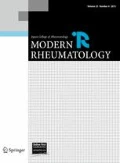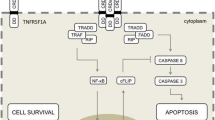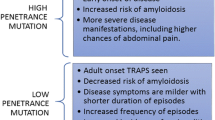Abstract
Tumor necrosis factor receptor-associated periodic syndrome (TRAPS) is a dominantly inherited autoinflammatory syndrome that is characterized by recurrent episodes of fever attacks associated with rashes, abdominal pain, myalgia, conjunctivitis, chest pain, and arthralgia. Some patients have severe abdominal pain leading to abdominal surgery. Most reported cases of TRAPS involve patients of European ancestry, but there have been nine reports of patients with TRAPS in Japan. Here, we review these nine case reports. Reported TNFRSF1A gene mutations in these nine index patients were C70S, T61I, C70G, C30Y, C30R, N101K, and N25D. Fever (100 %) was seen in all 23 cases. Most patients developed rash (erythema) (84.6 %) and arthralgia (73.3 %), and half suffered from myalgia (54.5 %) and abdominal pain (50.0 %). Although one-half of the patients suffered from abdominal pain, none underwent surgery. In contrast, only a small percentage of patients suffered from chest pain (20.0 %), conjunctivitis (20.0 %), and headache (10.0 %). Almost all cases (95.7 %) concerned patients whose relatives suffered from periodic fever. These findings suggest that the clinical features of Japanese TRAPS patients may be milder than those of patients in Western countries.
Similar content being viewed by others
References
Williamson LM, Hull D, Mehta R, Reeves WG, Robinson BH, Toghill PJ. Familial Hibernian fever. Q J Med. 1982;51:469–80.
McDermott MF, Aksentijevich I, Galon J, McDermott EM, Oqunkolade BW, Centola M, et al. Germline mutations in the extracellular domains of the 55 kDa TNF receptor, TNFR1, define a family of dominantly inherited autoinflammatory syndromes. Cell. 1999;97:133–44.
Hull KH, Drewe E, Aksentijevich I, Singh HK, Wong K, McDermott EM, et al. The TNF receptor-associated periodic syndrome (TRAPS), emerging concepts of an autoinflammatory disorder. Medicine. 2002;81:349–68.
Colburn N, Kastner D. Hereditary periodic fever. In: Hochberg MC, Silman AJ, Smolen JS, Weinbalatt ME, Weisman MH, editors. Rheumatology. 4th ed. Philadelphia: Elsevier; 2008. p. 1619–40.
Ida H, Eguchi K. TNF receptor-associated periodic syndrome (TRAPS) in Japan: clinical characterization, pathogenesis, diagnostic criteria, and treatment (in Japanese). Jpn J Clin Immunol. 2007;30(2):90–100.
Tsukamoto H, Ueda N, Horiuchi T. Progress in classification and treatment for TNF receptor-associated periodic syndrome (in Japanese). Jpn J Clin Immunol. 2011;34(5):361–8.
Lobito AA, Kimberley FC, Muppidi JR, Komorow H, Jackson AH, Hull KM, et al. Abnormal disulfide-linked oligomerization results in ER retention and altered signaling by TNFR1 mutations in TNFR1-associated periodic fever syndrome (TRAPS). Blood. 2006;108:1320–7.
Simon A, Park H, Maddipati R, Lobito AA, Bulua AC, Jackson AJ, et al. Concerted action of wild-type and mutant TNF receptors enhances inflammation in TNF receptor 1-associated periodic fever syndrome. Proc Natl Acad Sci USA. 2010;107(21):9801–6.
Aksentijevich I, Galon J, Soares M, Mansfield E, Hull K, Oh HH, et al. The tumor-necrosis-factor receptor-associated periodic syndrome: new mutations in TNFRSF1A, ancestral origins, genotype–phenotype studies, and evidence for further genetic heterogeneity of periodic fevers. Am J Hum Genet. 2001;69(2):301–14.
Stojanov S, McDermott MF. The tumor necrosis factor receptor-associated periodic syndrome: current concepts. Expert Rev Mol Med. 2005;7:1–18.
Pelagatti MA, Meini A, Caorsi R, Cattalini M, Federici S, Zulian F, et al. Long-term clinical profile of children with the low-penetrance R92Q mutation of the TNFRSF1A gene. Arthritis Rheum. 2011;63(4):1141–50.
Horiuchi T, Tsukamoto H, Mitoma H, Miyagawa H, Tamimoto Y, Yoshizawa S, et al. Novel mutations in TNFRSF1A in patients with typical tumor necrosis factor receptor-associated periodic syndrome and with systemic lupus erythematosus in Japanese. Int J Mol Med. 2004;14:813–8.
Takagi K, Kawaguchi Y, Fujikawa S, Otani T, Sugiura T, Hara M. Tumor necrosis factor receptor-associated periodic syndrome with a C30R mutation in a Japanese Family. Mod Rheumatol. 2007;17:265–6.
Kusuhara K, Nomura A, Nakao F, Hara T. Tumor necrosis factor receptor-associated periodic syndrome with a novel mutation in the TNFRSF1A gene in a Japanese family. Eur J Pediatr. 2004;163:30–2.
Ida H, Kawasaki E, Miyashita T, Tanaka F, Kamachi M, Izumi Y, et al. A novel mutation (T61I) in the gene encoding tumor necrosis factor receptor superfamily 1A (TNFRSF1A) in a Japanese patients with tumor necrosis factor-associated with periodic syndrome (TRAPS) associated with systemic lupus erythematosus. Rheumatology (Oxford). 2004;43:1292–9.
Manki A, Nishikomori R, Nakata-Hizume M, Kunitomi T, Takei S, Urakami T, et al. Tumor necrosis factor receptor-associated periodic syndrome mimicking systemic juvenile idiopathic arthritis. Allergol Int. 2006;55:337–41.
Nakamura M, Kobashi M, Tokura Y. A novel missense mutation in tumor necrosis factor receptor superfamily 1A (TNFRSF1A) gene found in tumor necrosis factor receptor-associated periodic syndrome (TRAPS) manifesting adult-onset Still disease-like skin eruptions: report of a case and review of literature. Br J Dermatol. 2009;161:968–70.
Nakamura M, Tokura Y. A novel missense mutation in tumor necrosis factor receptor superfamily 1A (TNFRSF1A) gene found in tumor necrosis factor receptor-associated periodic syndrome (TRAPS) with high serum interleukin (IL)-22. Eur J Dermatol. 2010;20(4):508–9.
Kai M, Tamaki S, Nishikomori R, Takaoka Y, Ohara O, Oshima K. A case of TNF receptor-associated periodic syndrome (in Japanese). Ryumachika (Rheumatology). 2011;45(4):456–60.
Ohmori S, Hino R, Nakamura M, Tokura Y. Heparin serves as a natural stimulant of the inflammasome and exacerbates the symptoms of tumor necrosis factor receptor-associated periodic syndrome (TRAPS). J Dermatol Sci. 2012;66:82–4.
Hull KM, Wong K, Wood GM, Chu WS, Kastner DL. Monocytic fasciitis: a newly recognized clinical feature of tumor necrosis factor receptor dysfunction. Arthritis Rheum. 2002;46(8):2189–94.
Tsuchiya-Suzuki A, Yamazaki M, Nakamura A, Yamazaki K, Agematsu K, Matsuda M, et al. Clinical and genetic features of familial Mediterranean fever in Japan. J Rheumatol. 2009;36(8):1671–6.
Sasaki H, Heike T. Hyperimmunoglobulinemia D and periodic fever syndrome (in Japanese). Jpn J Clin Immunol. 2011;34(5):382–7.
Sacré K, Brihaye B, Lidove O, Papo T, Pocidalo MA, Cuisset L, et al. Dramatic improvement following interleukin 1beta blockade in tumor necrosis factor receptor-1-associated syndrome (TRAPS) resistant to anti-TNF-alpha therapy. J Rheumatol. 2008;35(2):357–8.
Acknowledgments
This work was supported in part by a Grant for Research on Intractable Disease from Japanese Ministry of Health, Labour and Welfare (Chief: Takahiko Horiuchi).
Conflict of interest
None.
Author information
Authors and Affiliations
Corresponding author
About this article
Cite this article
Washio, M., Nakano, T., Kawaguchi, Y. et al. Tumor necrosis factor receptor-associated periodic syndrome (TRAPS) in Japan: a review of the literature. Mod Rheumatol 23, 210–217 (2013). https://doi.org/10.1007/s10165-012-0737-3
Received:
Accepted:
Published:
Issue Date:
DOI: https://doi.org/10.1007/s10165-012-0737-3




